Issue #29 / November 2012
Download PDF
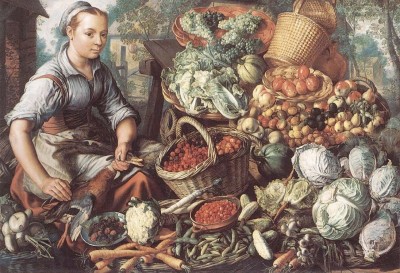
Commerce, by its very nature, is born free. And more than this, it forever fights to remain free. At almost every time and place, commerce evades regulations and controls; it serves its own will, not the wills of rulers. Markets spontaneously emerge at every opportunity, even when they are outlawed and punished. Commerce seems to have an existence of its own, like an independent organism.
Even under the worst oppressions recorded in history, commerce continued. This was true in the USSR and it was true in Nazi Germany, and it remains true now, even as the Western world runs headlong into a surveillance state abyss.
All that said, please don’t imagine that in referring to commerce, I am not including the mega-corps that seek to dominate the Earth in partnership with states. That is not at all what I mean, as I will explain below.
I’m going to start this issue by explaining the depth of this rebellion, then point out how it is currently showing up in the world. The rebellion is permanent; it continues in our time as in all others.
OPPOSING MODELS
Commerce does not rebel against regulation because of excesses. Rather, it is contrary to regulation by its very nature.
Commerce is a productive strategy. Strategies that exert control over commerce are oppositional, restraining production. The two are inherently opposed: on one side are people struggling to produce, and on the other are people struggling to either slow production or to skim it away.
In 1908, Franz Oppenheimer, a German physician and sociologist, published a book entitled The State. In it, he made the very important observation that there are only two primary modes of survival upon planet Earth: The Political means and the Economic means. Oppenheimer says this:
There are two fundamentally opposed means whereby man, requiring sustenance, is impelled to obtain the necessary means for satisfying his desires. These are work and robbery, one’s own labor and the forcible appropriation of the labor of others.
This stark statement is crucial for understanding how men live in this world – and how they have always lived in it: Men survive by either producing or by taking the goods of others. However many layers of publicity and complication may be present, every act by which men feed themselves can be broken down into one of these or the other.
The great problem with Oppenheimer’s statement has never been a question of its truthfulness, but that so many people are uncomfortable facing such a truth directly.
The statement that commerce and regulation are eternally at odds is merely a restatement of Oppenheimer.
ACTS OF WILL
Both commerce and control involve acts of will.
- Commerce involves individuals choosing to perform productive actions, such as growing food, making shoes and so on.
- Control involves individuals choosing to allow or disallow the willful acts of the productive or, to remove the fruits of production from the producers.
Commerce is an effect of active will. Commercial controls are the implementations of contrary wills, seeking to restrain the commercial will. The two are eternally at odds.
It is worth explaining here that the controllers of the Earth (that is, the various state rulers) are always forced to undermine independent will. They do this, not because they are all inherently cruel, but because their enterprises become nearly impossible if they don’t suppress individual will.
Ruling men by force alone is expensive; far too expensive to support rulership over a significant area. People who are ruled in that way quickly learn to hide their produce before it can be taken, or simply to run away. You cannot cage intelligent beings like you can beasts – it doesn’t work; they adapt.
To rule humans effectively, you must subvert their wills. You must make them believe that their wills are flawed and that using them is wrong. This is, of course, precisely what has been done since several millennia BC.
The will behind commerce, however, is born of the desire to survive, and that is not something that can be trained away. The survival instinct is permanent and commerce endures as its great tool. Even though people have been deeply conditioned to surrender their wills to the state, they remain able to use their wills for survival, and that leads directly to commerce.
The humans will find easy entry into the world in the form of commerce, even when other outlets are unavailable to it.
Taken in the aggregate, commerce – being the expression of the uncontrollable will to survive – can be seen as an independent force in the world. And it is always opposed to any wills arrayed against it: instinctively avoiding or eliminating them.
And since survival is hard-wired into us, commerce always pops back up, no matter how hard it is put down. However much it may be punished or repressed, it will forever rebel and return. Commerce is a permanent rebellion.
Because of this, nearly all arguments against commerce – certainly from the ruler’s side – are based on the need to restrain freedom, which means to restrain will. Economist Milton Friedman commented on this in his book Capitalism & Freedom:
Underlying most arguments against the free market is a lack of belief in freedom itself.
The great British author Samuel Johnson noticed the same thing when he wrote:
All theory is against the freedom of the will, all experience for it.
ANTI-COMMERCE, BUT PRO-INDUSTRY
While commerce and industry may, at a casual glance, seem to be almost the same thing, or at least to be larger or smaller versions of the same thing, there is a very important difference between the two.
This difference was clearly displayed among the tyrants of the 20th century: they were clearly opposed to the exercise of independent will – including independent commerce – but very much in favor of large industry.
Here is Adolph Hitler commenting on the destruction of individual will:
National socialism is the determination to create a new man. There will no longer exist any individual arbitrary will, nor realms in which the individual belongs to himself. The time of happiness as a private matter is over.
At the same time, Hitler was promoting German industry in every way he could. The German industrial conglomerates were his highly valued partners.
Stalin clearly outlawed independent commerce and killed untold numbers of people who were caught attempting it. But at the same time, he strongly championed industry, as was shown in the poster below, and many others:
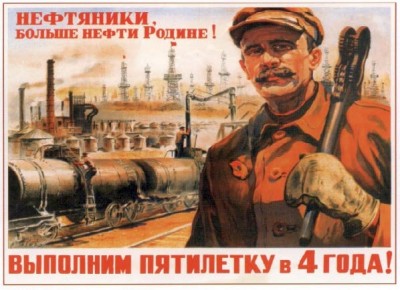
The key to understanding this odd difference is will.
- Independent commerce involves independent wills – wills that the ruler does not control.
- Industry involves individuals surrendering their wills to people above them in an organization, and obeying them. Rulers and their associates stand at the top of these obedience hierarchies.
While this contrast is seen vividly in tyrants like Stalin, it is present to one extent or another in every serious ruler: They are compelled to oppose independent wills that can contradict them or – even worse – who don’t think that they need a ruler.
This is why I am not including mega-corporations as “commerce” in this discussion. Giant corporations major in the containment of will, allowing it for a few at executive levels and strongly limiting it at lower levels. Mega-corps are also in clear partnership positions with the rulers, and frequently support government restrictions upon their smaller competitors.
Historically, independent trade was nearly always disliked by rulers and their “right-thinking” priestly or intellectual classes. They grudgingly allowed it, but they kept it to the fringes of respectability. Here, to illustrate, is a famous story from middle ages Europe:
A certain monk reported an important vision. He had been praying in his local church and opened his eyes to see demons everywhere. They were sitting on people’s shoulders, waiting in every corner of the church, and generally trying to distract anyone in any way possible. There were hundreds of them. Horrified, the monk left the church and walked into the market square. There, he looked about and saw but one lone demon, sitting high on a pole and observing the people buying and selling. Seeing this, the monk was thoroughly distraught and prayed bitterly to God for an answer. How could it be that the church was full of demons, but the market had only one? Soon enough, the answer came: The demons had to flock to the church, because that’s where people were being turned god-ward. In the market place, the answer continued, the devil already controls them all, so he needs only one demon to observe.
Control is also a factor in this, since small operators are skillful at avoiding taxes, and taxes are the life-blood of the state. Arguments like this one can be made:
The rulers only really care about money (not will). Their concern about small business is that these guys cheat on their taxes, while the giant corporations have a much harder time hiding their money.
And while there is some truth to this, the argument still comes back to will: A small company operates on the basis of individual will, and the large company operates on the principle of harnessing many wills. The willingness to cheat on taxes comes from the individual use of will.
THE REBELLION HAS ALWAYS BEEN
It is important to note that the permanent rebellion of commerce has always been. At any point in human history, if you can find a comprehensive view, you will see commerce acting on its own will. These stories seldom appear in general history books, but the great eruption of knowledge in our time allows us to find many of them.
In FMP #20, I covered the oldest of these stories: that of human trade in pre-history:
Thousands of years before there were states, treaties, or any other such institutions, people gathered up valuable goods, figured out how to transport them, and took off to find far-off strangers to trade with. These traders – who exemplified independent commerce – were the real heroes of history. Their lives and work contributed to human happiness far more than that of any king or prince. No one told the traders that they should go and seek others and no one authorized them; they simply went and traded because it was beneficial and natural to do so.
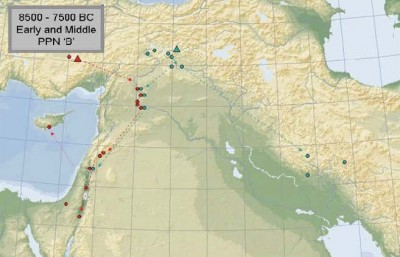
For example, the map above shows the near-East obsidian trade routes of approximately 8000 BC. (I’ll pass up an explanation of why obsidian is such a wonderful tool for archaeologists; you can find it in the back issue mentioned above.) There are similar maps, by the way, going back to 14,000 BC.
As you look at this map, consider this: This trade was conducted five or six thousand years before the Great Pyramid was built. There was no Egypt, no Sumer, no Babylon or any of the other famous “first civilizations.” Egypt and the rest are closer in time to us than to these obsidian traders. This trade covered an arc of approximately two thousand miles, and was conducted by individuals who simply loaded up, went out and found ways to cooperate with strange and distant peoples.
A more modern example is that of the Hansa, a northern European trading group of the Middle Ages. The Hansa conducted free trade for a few hundred years, being detested and opposed by governments the whole time. History books report that the Hansa “received trade concessions,” but the truth was usually that they refused to pay taxes and had strength enough to make their refusals stick.
And, of course, there are many such stories, through all historical periods.
Control in our time, unfortunately, has been extended massively through professional regulation laws. By promoting one fear after another, people have allowed commerce to be chained to official approvals. This has been especially prominent in the past generation, as government regulations were very effectively sold as the great salve for fear.
In the face of this greatly expending control, however, commerce is again exerting its will, as we will examine below.
ROGUE COMMERCE NOW
Rogue commerce – referred to in ‘polite company’ as the informal economy – accounts for a huge portion of all economic activity. Even in Europe, arguably the most controlled markets on the planet, large portions of economic activity avoid the state, as you can see in the graphic below.
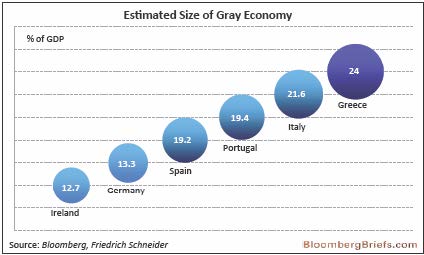
Commerce, even in these locations, finds a multitude of ways to avoid control. You’ll notice in this chart that the ‘gray economy’ in Italy is equal to almost 22% of national GDP. This continues, even though Italy has a separate police force, dedicated to punishing all such economic activities. Here is a photo of a financial policeman and his vehicle. These petty officials are seen nearly everywhere in the country, on a daily basis:
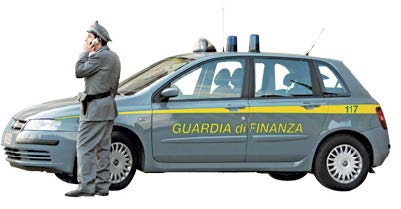
Avoiding control is continuous:
- Restaurants take cash and avoid reporting it by not ringing their register, even though governments make failing to provide a receipt illegal.
- Hawala money transfers occur over half or more of the planet, and are, more or less, completely uncontrollable by national ‘authorities’.
- Mafia and similar groups specialize in evading control in larger affairs, using bribes and other methods.
- Many less developed countries function with high levels of “corruption.” But while “corruption” sounds very bad, in practical terms it means that you can get what you want for a small fee.
- The underground economy – sometimes called System D – accounts for an estimated 1.8 billion jobs, world-wide, and ten trillion dollars worth of transactions annually. (Even the esteemed Foreign Policy magazine acknowledged this, in their issue of October 28, 2011.)
- Construction professionals will often provide discounts for cash.
- Nearly every city in North America has a thriving underground market of pot-sellers. These tend to be quite separate from the cocaine markets and involve person-to-person deliveries at bars, offices and homes.
- And so on.
A few years ago, I was able to trace the architecture of black market trading in a large area of Italy. I will summarize my findings below, but I will not identify any cities in particular. Naming them wouldn’t really be a problem, since the various state authorities have to know fairly well what is going on, but the rule of rogue commerce is that you do not disclose details unless you have a good reason, and I will hold to it. If these merchants were using violence or routinely stealing, I wouldn’t care, but the commerce that I saw was voluntary.
I found the following:
- Large shipments of goods (fashion knock-offs being the primary products) were coming in through a large port city. It is safe to assume that organized groups (‘mafia’ types, though not necessarily violent) were involved, paying government agents to turn a blind eye to their business.
- Their goods were moved from the port city to mid-sized cities, mostly in vans or on commuter trains. The couriers seem to be primarily Eastern Europeans.
- From the mid-sized cities, the goods were either picked up by the end-vendors (usually from the Indian sub-continent or Africa), or on to further distribution points in the major tourist centers.
- The goods ended up being sold by unlicensed vendors like these, on a famous bridge in Rome:
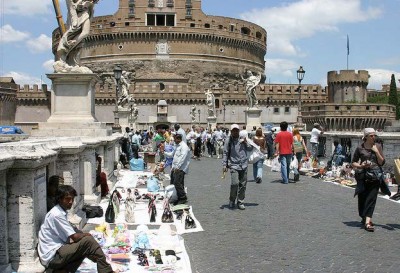
- Notice that these vendors keep their goods on bed sheets. Not only does this make for a nice display, but it allows them to quickly roll up their inventory and run away, should the police try to raid the area.
- I did watch the vendors in a similar location as a police raid occurred: They were tipped-off slightly in advance (I think one vendor at the edge saw the police coming), then loaded up and ran down stairways to the river level and began to disburse. They remained at some distance until the police left and an all-clear report was passed from merchant to merchant. Then, they went back to business.
- There are small vendor locations in hundreds of neighborhood locations and in the market areas of small towns as well.
The vast majority of the world’s informal markets, however, are much simpler in structure than the operation I describe above. In general, they involve small farmers (scattered over a wide area), their relatives, cooperative friends, trucks, cars, busses (with helpful bus drivers, who deliver goods reliably), and obtaining space at a local open market.
Most of them look, more or less, like this one, in India:
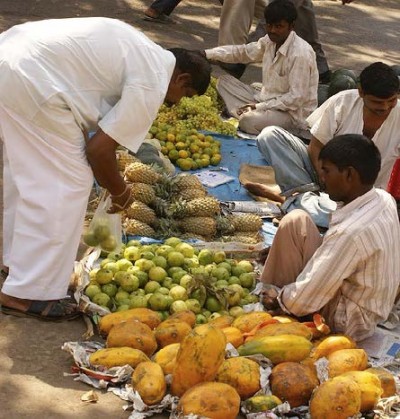
Another avenue of forbidden commerce in the West is immigrant banking. This is informal banking, based upon trust. Many immigrant groups have done this over time, but the group I observed most closely in recent years was the Koreans.
The local Korean banker was a lady who ran a simple dry cleaner store. She was chosen because of her personal reputation for honesty, and she took payments from young Koreans, kept their accounts, and consulted with a group of Korean businessmen who made loans to the younger people (typically for houses) if they had shown themselves to be of good character.
THE WIRED BLACK MARKET
The great black market of the moment is Silk Road, an anonymous Internet marketplace.
Silk Road operates on the Tor anonymity network, using a technology called Onion Routing. It also uses – exclusively – Bitcoin, which is an innovative and popular digital currency. Bitcoin isn’t precisely anonymous, but it is close enough, especially for users who take care with its use.
You can buy or sell nearly anything on the Silk Road site, and deliveries are generally made through national mail systems. Even though illegal substances are being shipped, the postal systems do not have the time or money to search more than a token number of packages, and most shipments get thorough without a problem.
To illustrate just how “black market” Silk Road really is, here is a screen-shot of a recent Silk Road home page:

Silk Road is not just about selling drugs, of course; the forum is really the core of the site, where a great deal of social interaction occurs. Vendors are charged to create an account, and all sellers have to earn a positive reputation over time. This illustrates an interesting characteristic of black markets:
To be trusted in a black market, you must be better than you’d have to be in a government market: More reliable, more reasonable, more trustworthy.
Here are some further characteristics of this market:
- All transactions are in Bitcoin. Anyone who talks about using Paypal or fiat currency is ostracized on the forums and ignored on the market.
- All messages and addresses are encrypted to the keys of the corresponding parties. Encryption is mandatory.
- All transactions are held in escrow, and no good vendor would ever ask a buyer to disburse escrowed Bitcoins before they receive their product.
- The site offers a hedging feature, at a fee of 3%. Hedging is to protect vendors, with a guarantee that if Bitcoin’s value becomes unstable, they will receive the approximate value of what was agreed upon at the time of sale.
- The site automatically runs a tumbler that breaks payments into multiple pieces, and sends each through a series of randomly generated pass-through accounts.
- Disputes can be handled by a virtual arbiter, but most disputes are resolved without outside input.
It is worth noting that the Bitcoin network is already more powerful than the world’s top 500 public supercomputers combined.
A Bitcoin administrator claims that over 99% of all transactions conducted within the escrow system are completed to the satisfaction of both buyer and seller, or a mutually agreed upon resolution is found.
I will cover Bitcoin in a future issue, but in the mean while, you can find good information at http://bitcoin.it.
What is most interesting about the Silk Road and Bitcoin markets is that the participants are paying attention to philosophy, law, history, and so on. They are creating new technologies, as well as developing trust mechanisms and new protocols for distributing their products.
In other words, they are displaying active will.
WHY DRUGS?
A lot of people, upon seeing Silk Road, say something along the lines of, “Ughh, drugs?” And, not being a particular fan of drugs myself, I am able to sympathize. But there are good reasons for this:
For starters, drug sales are a voluntary but forbidden business. People have always wanted such substances, and they are not so stupid that they don’t care about quality and safety. At Silk Road, they can be sure of finding good product and reliable, rated sellers, rather than hoodlums.
Another reason is this: It is always people on the edges of “the law” that use new and forbidden technologies (such as anonymous markets). This actually follows an area of study in economics called Property Rights Theory, which states that new areas are converted to private use when the benefits of doing so outweigh the costs.
Applied to this situation, Property Rights Theory suggests that the first rogues to wall-off private areas of cyberspace should be people who don’t care about the risk, or people who the rulers would be willing to hurt anyway. (If they’re already willing to hurt you, you incur roughly zero additional risk by walling off a market.)
This, of course, is exactly what happened. The first to wall off anonymous markets were freedom activists, followed by gamblers, sex workers, and people wanting to trade illegal drugs.
As Silk Road and Bitcoin develop, however – and as more anonymous trading occurs –drugs will likely dominate less and less, probably becoming a minority product over time.
Economist Milton Friedman described places like Silk Road in this way:
The black market was a way of getting around government controls. It was a way of enabling the free market to work. It was a way of opening up, enabling people.
And, once again, that is really what commerce is about: Enabling individuals and individual will.
Commerce stands, as it always has, in rebellion to impositions of will. It is survival made active. It is individual will made active. However much it is punished and repressed, commerce will continue to bounce back and rebel.
So long as humans remain humans, commerce will rebel against rulership. It is simply in the nature of the beasts.
* * * * *
See you next month.
PR
